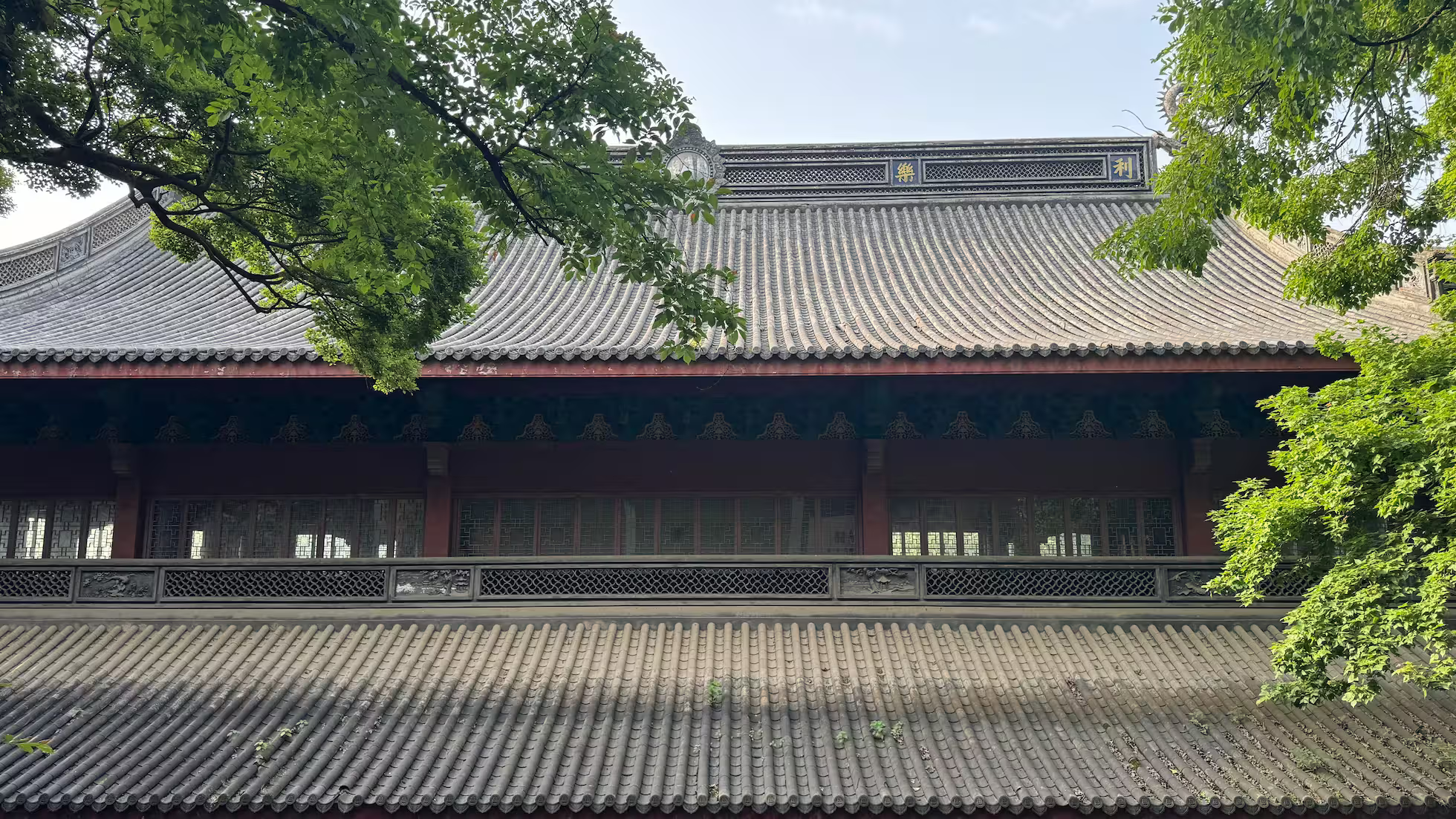An Extra Half Steamed Bun

This morning, I woke up with a sudden urge to take a stroll around Faxi Temple. The temple opens at 6 AM, which is the best time to visit since it’s quiet and peaceful. At 6:30, I entered the temple gate. The male layperson who was handing out incense sticks told me that if I planned to have a vegetarian meal, I could come back for the incense after the meal to avoid breaking the incense sticks. I told him I would offer incense first and eat afterward. He kindly reminded me that the meal would end at 7 AM and not to miss it, handing me three sticks of incense. Checking the time, I thought I’d better hurry if I wanted to finish my incense offering and still catch the meal in time. After thanking him, I walked up the path toward the halls for my offering. Along the way, I saw young people already leaving the temple.
In recent years, Faxi Temple has become increasingly popular among young people. One reason is the character “喜” (xi), meaning joy or happiness, in its name, which resonates with the pursuit of peace and happiness among the younger generation. However, the temple was originally renamed during the reign of Emperor Kangxi of the Qing Dynasty, inspired by a line from the Avatamsaka Sutra: “The sound of the Buddha brings joy and happiness, allowing all beings to attain the joy of the Dharma.” Another reason for the temple’s popularity is the stunning view from the back mountain, which offers a picturesque overlook of the temple complex—a favorite spot for photography. The temple’s abbot, aware of this trend, thoughtfully posted signs at the scenic points asking visitors to “queue orderly and take photos politely,” subtly guiding people to the best photo spots. Furthermore, many of the monks’ teachings align with the lifestyle and mindset of young people today. Lastly, the temple’s vegetarian meals are genuinely simple and affordable.

Unlike some temples that serve food specifically for pilgrims, which the monks themselves don’t eat, the vegetarian meals at Faxi Temple are the same as what the monks eat. Moreover, the price is very reasonable—breakfast is two yuan, and lunch is five yuan. The meals are indeed quite simple: breakfast consists of a bowl of plain porridge, a steamed bun, and some pickled vegetables, while lunch is a bowl of rice with a serving of vegetables. There’s a well-known story about the temple’s vegetarian meals. Many years ago, a group from Zhejiang University was on a hiking trip and sought assistance from the abbot. They explained that they were upholding the university’s spirit of endurance and perseverance in organizing a long-distance hike from Yuquan Campus to Zhijiang Campus and asked if they could use the temple as a rest stop at noon. The abbot agreed and even provided free vegetarian meals to the hikers. This tradition has continued every year, with the temple providing free lunches to the hikers, adding a sense of ceremony to the event. Over time, the Zhejiang University students who’ve eaten at Faxi Temple humorously refer to themselves as “undergraduate monks,” “graduate monks,” and “PhD monks.”
After finishing my incense offering and taking some pictures at the back of the temple, I made my way back to the dining hall. It was already 6:55 AM, and the hall was mostly empty, with only one worker having breakfast. When the female layperson saw me approaching, she quickly prepared a bowl of porridge and a serving of pickled vegetables. She then mentioned that there was only half a steamed bun left and asked if I wanted it, adding that it would go to waste otherwise. It seemed I was too late, and only half a bun remained, but I didn’t mind, as I typically eat a small breakfast anyway. I told her it was fine and to give it to me. She placed half a bun on a plate, but then added a whole steamed bun as well before handing it to me. Ah, I misunderstood her intentions. Perhaps, since breakfast was about to end, she didn’t want the half bun to go to waste. Feeling a bit awkward, I took my porridge and buns and found a corner to sit down.
For someone like me, eating a bowl of porridge and a whole steamed bun is already a lot. Now, with an extra half bun, it seemed even more difficult. Plus, porridge with steamed buns is a heavy carbohydrate load. I considered not eating the extra half bun. Normally, this wouldn’t be a big deal, but since I was in a temple, it felt like some mysterious force was at work. Just as I was debating this, I looked up and saw two large scrolls on the opposite wall, with clear words written in black ink on red paper: “You may eat and drink, but do not waste,” and “Eat only food, refrain from tobacco and alcohol.” Could this be the Buddha giving me a special lesson by offering me the extra half bun? Thinking of this, I decided to finish everything—the porridge, the buns, and the pickles—down to the last bite.
As I was about to take my dishes to the return station, another female layperson quietly came over and told me to just leave them on the table, that she would collect them later. She then gracefully left. Already feeling a bit mystified by the extra half bun, I found this strange too. I pointed to the return station and asked again, “Are you sure I don’t need to take them there?” She confirmed, “Just leave them on the table, I’ll handle it.” But I clearly saw the other worker take his own dishes to the return station earlier. As I hesitated, the layperson came back to the table and took the dishes herself.
Leaving the dining hall, I felt a bit unsettled. Next time, when I return to the temple, I’ll make sure to offer a few extra bows in front of the Buddha.



